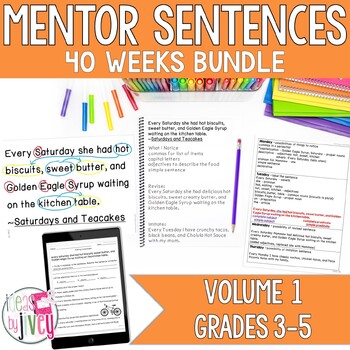Except it wasn't sticking. I was teaching my heart out and the kids were working their little hearts out, but there was no transfer to their writing.
Several years ago, the district I was in at the time encouraged us to start using mentor sentences. Let's clarify what encourage meant. We were told:
•Mentor sentences are a more authentic way to teach grammar and punctuation.
•The concept is from Jeff Anderson's book, Everyday Editing.
•It works really well.
The end.
Anyway, with all that amazing support, I decided to give it a shot (crazy, right?) Even though I had no clue what I was doing, I jumped in after doing a little reading on the Internet. Sounds like the basis for a great start. Incredibly, even though I had almost no idea what I was doing, I did see gains in my students. They enjoyed it, and I saw a payoff in both their conventions and craft.
And then I quit.
Why on earth would I quit? It was exhausting. I sure there are wonderful teachers out there that can juggle those balls, but for me it ended up being a really awesome thing that I didn't have time to create every week. I wish that wasn't true, but that was my testing overload, meeting filled, documentation all day everyday reality.
Another fact for you (this one a little embarrassing), I am TERRIBLE at parts of speech. I'm still not sure what a gerund is. So, we headed back to DOL. While I whole heartedly embraced the belief behind mentor sentences and saw the positive impacts of it, I simply wasn't able to make it work with the reality of my limited lesson prep time.
Flash forward a few years, and my only problem with mentor sentences was solved. Ideas by Jivey took care of the trickiest part of teaching-reality. With this in hand, I took the time over the summer to read Jeff Anderson's Everyday Editing. It was helped me understand why, despite my very best effort, my instruction wasn't sticking. Here are a few quotes from the book:
If you are looking for a change that sticks in your conventions instruction, I strongly recommend reading Everyday Editing. While it is entirely possible to do the work yourself, I definitely think getting started with the units from Ideas by Jivey is a much more sane way to go. Once you get the hang of it, you may feel more comfortable with creating your own lessons to go along with a book your class is reading.
Want to learn more? You can check out Jeff Anderson's book, Everyday Editing, on Amazon. At 160 pages, it's a pretty easy read especially since over 100 of those pages are him walking you through 10 lessons.
{affiliate link}
Jivey has an AWESOME Facebook group with tons of videos of lessons that will help you get jumped started. I'm a visual person, so it really helped me to see these lessons in action. You can click here to join.
Visit Ideas by Jivey's Teachers Pay Teachers store to see her mentor sentences resources. Read more about mentor sentences on her blog.









